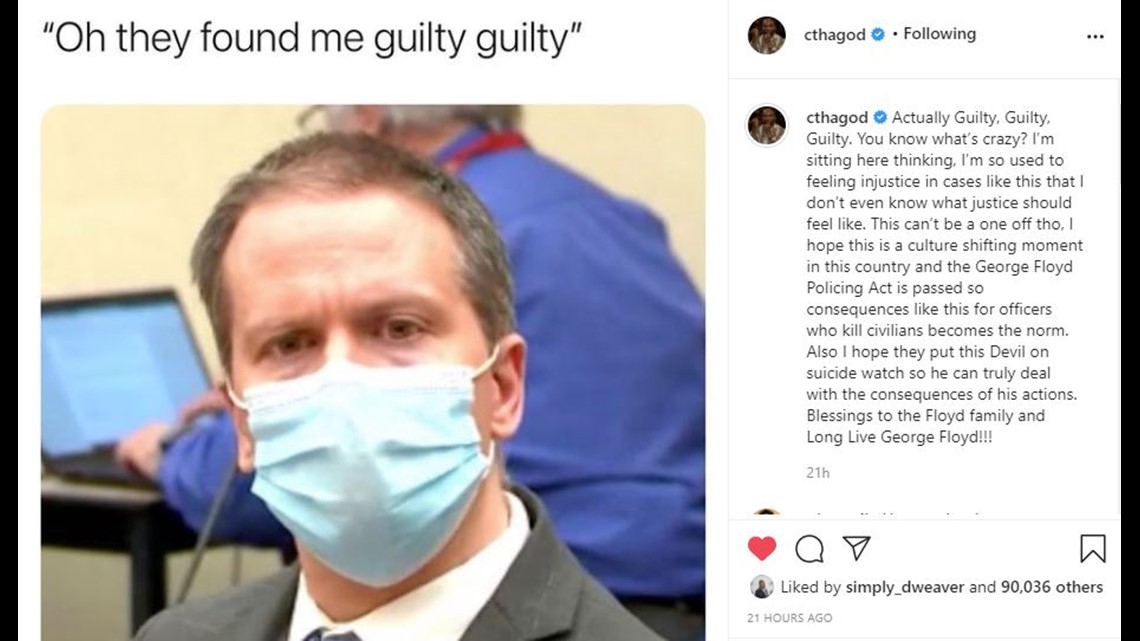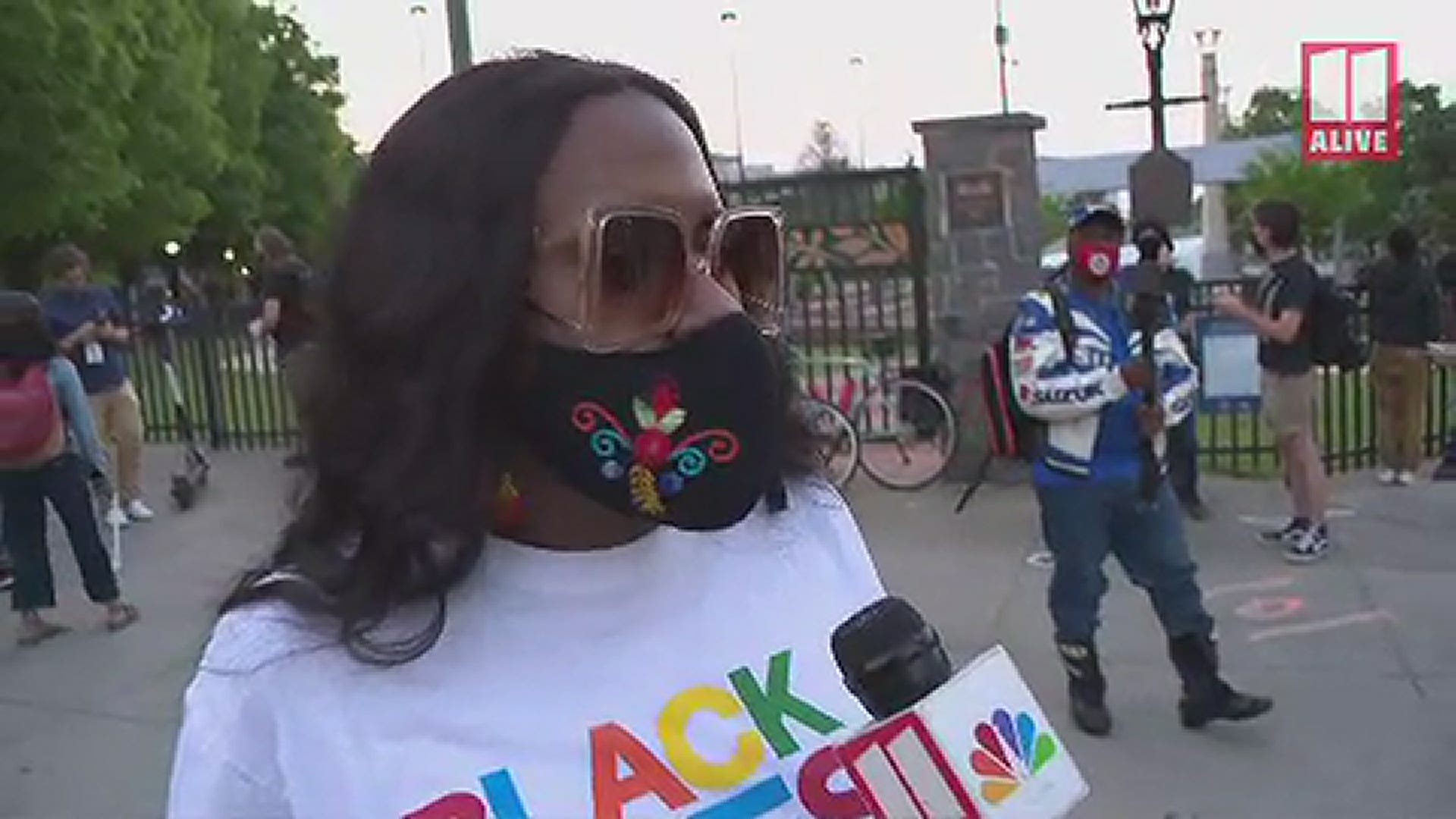ATLANTA — As the world grapples with the guilty, guilty, guilty verdict that was heard around the world in the Derek Chauvin murder trial, it also brings into question the larger meaning of a word used all too often -- justice.
With a less than 10-hour jury deliberation, former Minneapolis police officer Chauvin was found guilty of murder and manslaughter in the May 25, 2020 death of George Floyd. Multiple police body cameras, street cameras, and up-close bystander video captured Chauvin kneeling on Floyd for nine minutes and 29 seconds before he died on the Minneapolis streets that evening.
RELATED: Georgia politicians, groups react to Derek Chauvin's guilty verdict in murder of George Floyd
Chauvin was found guilty of second-degree murder, second-degree manslaughter, and a third-degree murder charge.
While many say justice has finally been served, others look at this as an act of accountability.
Defining justice:
Racialequitytools.org defines justice in two different forms.
Racial justice is defined as:
"The systematic fair treatment of people of all races, resulting in equitable opportunities and outcomes for all. Racial justice - or racial equity - goes beyond 'anti-racism.' It is not just the absence of discrimination and inequities, but also the presence of deliberate systems and supports to achieve and sustain racial equity through proactive and preventative measures."
Restorative justice focuses on the repair of wrongdoing.
"Restorative Justice is a theory of justice that emphasizes repairing the harm caused by crime and conflict. It places decisions in the hands of those who have been most affected by a wrongdoing and gives equal concern to the victim, the offender, and the surrounding community. Restorative responses are meant to repair harm, heal broken relationships, and address the underlying reasons for the offense. Restorative Justice emphasizes individual and collective accountability. Crime and conflict generate opportunities to build community and increase grassroots power when restorative practices are employed."
Defining accountability:
Racialequitytools.org defines accountability as:
"In the context of racial equity work, accountability refers to the ways in which individuals and communities hold themselves to their goals and actions, and acknowledge the values and groups to which they are responsible.
"To be accountable, one must be visible, with a transparent agenda and process. Invisibility defies examination; it is, in fact, employed in order to avoid detection and examination. Accountability demands commitment. It might be defined as 'what kicks in when convenience runs out.”' Accountability requires some sense of urgency and becoming a true stakeholder in the outcome. Accountability can be externally imposed (legal or organizational requirements), or internally applied (moral, relational, faith-based, or recognized as some combination of the two) on a continuum from the institutional and organizational level to the individual level. From a relational point of view, accountability is not always doing it right. Sometimes it’s really about what happens after it’s done wrong."
What people are saying about the two words:
Activist and host of Pod Save The People, DeRay Mckesson, tweeted this shortly after the verdict rang down in the Chauvin trial: “Remember, accountability is what happens after the trauma, justice is the idea that the trauma shouldn’t exist in the first place.” He went on to say, “The police have already killed over 300 people in 2021. One verdict does not bring them back. The demand for justice continues."
Minnesota Attorney General Keith Ellison echoed DeRay's conceptualization of the distinction.
“I would not call today’s verdict 'justice,' however, because justice implies true restoration. But it is accountability, which is the first step towards justice. And now the cause of justice is in your hands. And when I say your hands, I mean the hands of the people of the United States.”
Brene Brown, a well-known researcher, famously said "there is no justice without accountability.”
On Tuesday, the researcher tweeted more on the concept.
“Repair begins with accountability. We still have so far to go. I am grateful for this verdict and devastated that George Floyd is not here today. We keep fighting.”
Radio personality, media mogul, and Black Effect Podcast Network Owner Charlamagne Tha God posted this on Instagram, which captured what so many people across the Black diaspora realized upon hearing the guilty verdict.
"You know what’s crazy? I’m sitting here thinking, I’m so used to feeling injustice in cases like this that I don’t even know what justice should feel like," he said in a long Instagram caption. "This can’t be a one-off tho, I hope this is a culture-shifting moment in this country and the George Floyd Policing Act is passed so consequences like this for officers who kill civilians become the norm..."
More than 90,000 people liked his post.


In the wake of the guilty verdict, the Black community continues to grapple with an indescribable feeling we're not too familiar with as a culture when confronted with racial injustices -- a mix of exasperation, sorrow, anger with a new sprinkling of surprise -- while also longing that more hope and deliberate restorative action is somewhere upon the horizon.
But how close that is, and what more will it take for it to arrive, how many more deaths need to be filmed, are some of the things people around the world are asking. The answer is on a continuum as so many people strive to pass, update and create legislation aimed at reforming, reallocating, and updating the burden placed on both citizens and the police system.

